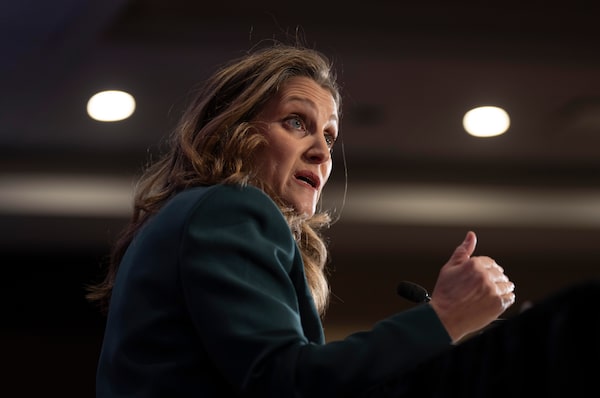
Deputy Prime Minister and Finance Minister Chrystia Freeland speaks during a news conference before delivering the federal budget in Ottawa on March 28.Adrian Wyld
Ottawa is planning to raise billions of dollars from banks and insurers through a change in tax rules on dividends that financial institutions receive from Canadian companies.
The Liberal government delivered the second major shift in taxation for the financial sector in two years as part of the federal budget unveiled Tuesday. The measure is expected to drum up $3.15-billion over five years starting in 2024, and $790-million annually after that.
The government plans to amend tax treatment on dividends of Canadian shares held by financial institutions. The update would require banks and insurers to count those dividends as business income.
By excluding dividends from their income, financial institutions have been able to lower their tax burden and reduce government revenues that could be used for public services, according to the budget.
The Canadian Bankers Association said it is reviewing the budget to assess its implications for the industry. “Strong banks are a hallmark of our country, and they are key contributors to durable economic growth for all Canadians,” CBA spokesperson Mathieu Labrèche said in an e-mailed statement.
Federal budget 2023: 7 key takeaways on climate, dental care and the deficit
This marks the second taxation blow to the financial sector in a year. Last April, the government introduced two new charges in its budget.
The first, named the Canada Recovery Dividend, required large banks and life insurers to pay a one-time 15-per-cent tax on taxable income above $1-billion for 2021. It is expected to raise $604-million annually starting in 2022, for a total of $3.02-billion over five years, according to estimates by the Parliamentary Budget Officer in September.
The second measure revealed was a permanent change to the sector’s corporate income tax rate, up 1.5 percentage points to 16.5 per cent on taxable profits over $100-million. The PBO estimated that the increase would raise $2.25-billion over five years.
Brian Ernewein, senior adviser with KPMG and a former senior tax specialist with the Finance Department, said Canada’s banks will likely take issue with the latest measure announced in the budget.
“I’m not sure the banks were expecting this change,” Mr. Ernewein said. “It is the case that the banks have been subject to a number of fairly significant measures now, with the two year surcharge, with the extra corporate tax rate. ... So they may feel as though they’re being asked quite a lot with those and this measure combined.”
The amendment was one of several proposals targeted at the financial sector, including legislative changes aimed at emerging risks in the industry. Two weeks before the budget release, U.S. and European bank stocks plummeted after the failure of California-based Silicon Valley Bank crippled confidence in the sector.
While the big, diversified Canadian banks were largely unscathed, the turmoil thrust the industry globally into uncertainty and prompted questions around regulatory scrutiny and protections in the case of a run on deposits.
The issue of uninsured deposits in Canada made a brief appearance in the budget. The government said that it could consider amending legislation to expand the Canada Deposit Insurance Corporation’s ability to increase deposit insurance and other related measures in the case of market disruption. The U.S. Federal Deposit Insurance Corp. covers up to US$250,000 per eligible deposit, but Canadian depositors are insured for less than half of that at $100,000.
The government also plans to expand the mandate of Canada’s banking regulator to include determining whether financial companies have sufficient protection against security threats, such as foreign interference. This could also include bolstering the range of circumstances in which the Office of the Superintendent of Financial Institutions can take control of a federally regulated financial institution, including instances where shareholders were unable to exercise their voting rights, or where there are national security risks.
In addition to escalated risks thrown into the spotlight by the banking crisis, the government pointed to failures of crypto trading platform FTX, and of New York-based Signature Bank, as examples of the need for more consumer protection from risks with the digital assets.
The budget said OSFI will consult with federally regulated financial companies on guidelines for disclosing their crypto-asset exposure. The government will also require federally regulated pension funds to disclose their crypto exposure to the regulator, and plans to discuss the matter with provinces and territories to help holders of the country’s largest pension plans understand how the assets may affect their portfolios.
With a report from Bill Curry